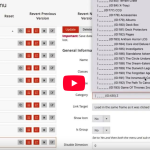
October 7,2021
How to show social proof on eCommerce websites
![]()
Something that’s important in any business is providing social proof. Social proof is defined as a social phenomenon where people copy the actions of others in an attempt to undertake behavior in a given situation.
Simply put, people will follow the influence of what others do, which is important when it comes to marketing as the end result is you want people to contact you, you want them to buy from you, and one way to help push this along is with social proof.
For eCommerce websites, this is even more important, where as, if someone contacts a service based website, other than their time, they haven’t lost anything if they choose not to work with them. For eCommerce on the other hand, you have to convince them to part with their money and buy from you, for this, using social proof can help increase your conversion rates.
There are multiple ways of displaying social proof, which we have split into 3 categories:
- From customers
- From usage
- From other brands
Each of these categories will show different ways you can show your customers social proof, so you can pick and choose the ones that best suit you.
Social proof from customers
Ratings and reviews
First on the list is one of the most obvious, around 63% of consumers are more likely to buy from a website that has product reviews and ratings. So this can help drive people to check products and demonstrates that the products have been bought and are worth buying (if it has good reviews). You should be aiming to get these after each sale, remember to send a follow up email a few days or a week after the order is delivered asking for their feedback. This will help improve your review numbers on the website.
Customer testimonials
These show that customers have used your services and trust you. Provides social proof by highlighting that people buy from you and what they actually say about you as a company, helping to build trust. You can request for these after an order has been sent, where you have them post the testimonial is up to you, some could be social channels like Facebook, as 71% are more likely to purchase based on social media referrals. Alternatively, you can get them to post their testimonials as reviews, like on Google.
Customer photos
They say that a picture is worth a thousand words, and getting your customers to ask them to post photos of their orders can be especially powerful. This is a very good way of showing social proof for products with great visual appeal, such as garden products and structures, as people can see your products in real life situations and get a better sense of what they are like.
Similar to getting other types of feedback from customers, you can send a follow up email after they have received the order, asking them to send a picture or post it and tag you on their preferred social media channels. Remember, if you have a preference of social media channel you want them to post it on, link them your page and let them know your @ name.
Case Studies
Case studies help demonstrate to customers your products in a real life situation and how they improve people’s lives. These might not be appropriate for all eCommerce websites, but for those that they are, can be a great way of demonstrating social proof.
If you have both a testimonial and customer photos, these can be combined and used as part of your case study. You can request to write one about a customer who have given a testimonial or photo, make sure to keep a list of them.
Social proof from stats
Real-time stats
If you have an eCommerce website with decent statistics, you can show real time stats of your website’s usage. These stats will demonstrate social proof by showing customers that others are using the website as well as them, which then helps to build trust.
The stats you show can vary depending on what you are able to demonstrate popularity, for example, you wouldn’t want to show that no people are looking at a product on the website, (unless you have an auction site like Ebay). So check your stats before you commit to this, or add exceptions to the tool you use, to only show the stats you want.
Some examples of website could be:
- Number of people on the website.
- Number of subscribers to your emailing list.
- Number of orders processed that day so far.
- Number of views for a particular product within a time frame (last hour).
Number of orders
Number of orders is similar in principle to the real-time stats, but you show static stats, rather than dynamic. The fact that the numbers are static may limit what you can show, compared to the real time stats, however, this does not mean it can’t have the same effect.
Some examples you could use, that can be updated at intervals of your choosing are:
- Number of orders placed within the last time period (6 months).
- Over X amount of a product sold.
- Number of happy customers.
These all offer alternatives to real-time, that can be updated when a new milestone is reached and demonstrates social proof.
Social share count
If you have an impressive number of people who like your social profiles, this can demonstrate social proof of your popularity. Having a small counter somewhere on the website to show the social proof and also encourage more people to like your page or profile.
Another option is, if you have share buttons on your product pages, these can also provide share count numbers, help expand the people that see your products if they are shared as well. As we mentioned previously, 71% are more likely to purchase based on social referrals.
Best seller
Having a way of tagging best seller products can show social proof by implying that of the products bought on the website, you have enough data to show that the marked ones are the more popular ones. This can also help to increase conversions of particular products, essentially directing your customers to a “recommended” product.
Customers also bought
Customers also bought is a recommendation, you will normally see on the product page, displaying complimentary products to the one they are looking at. This is a great for offering cross-sells to your customers, which, for Amazon, contribute up to 35% of overall revenues, so it is worth having cross sells on for that reason alone. However, this also shows social proof by telling people buying your products and that you are able to make recommendations based on what others have also bought.
Leveraging social proof from known brands
Recognised badges
Recognised badges on the website that the majority of people will recognise. These can be things like badges for the payments accepted (Paypal, GooglePay), or even known brands that your website integrates with. These show social proof through the fact that these brands are recognised, helping people feel more at ease and trusting that any personal details you may take are used securly.
If you have any integrations from known brands that you can display on your website is a good idea, you could sign up for Google’s trusted stores, which you can then have show throughout the website. If no specific ones are available, payment gateways you use can be added as recognised badges.
Certifications
Certifications help build social proof through the fact that your company is worthy of special mention and certification badge on the website. This may not apply to all eCommerce websites, but for some there are recognised industry certifications that will help show social proof on the website.
For those eCommerce sites where there are few or no industry certifications worth obtaining, there is also the option of awards. Any awards you have, for whatever reason can be worth adding to the website to show your social proof, by the fact that you have beaten other companies to obtain the award.
Customer base
For the customer base, if you have any notable people or businesses you’ve worked with and you have their permission, using their logo to leverage their brand recognition and associate it with yours will help build social trust. This can be someone you supply with products, or someone notable who has used your business, it shows that known people and brands put their trust in you.




